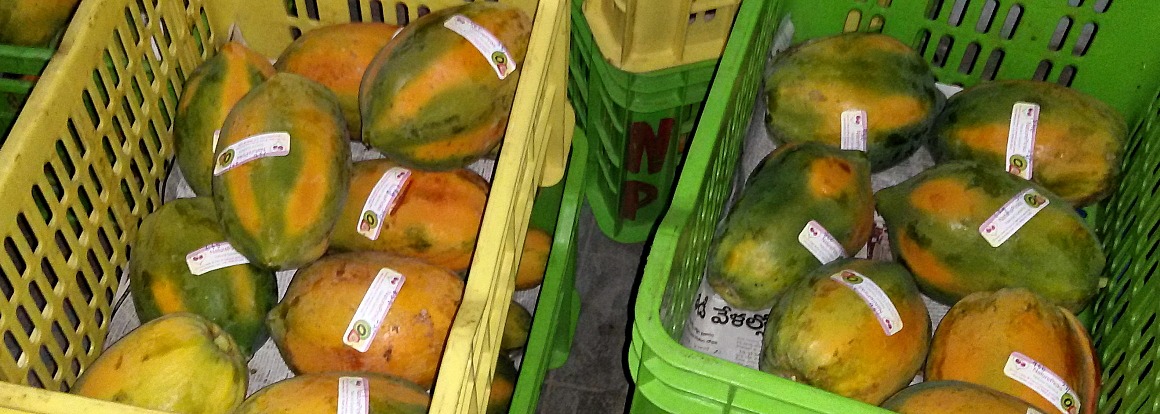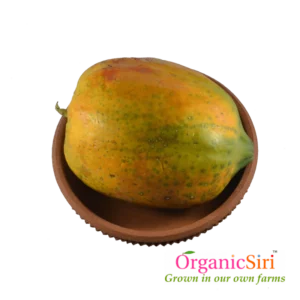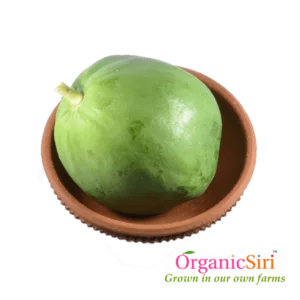Does papaya bring images of a bitter, pungent, unpleasant smelling fruit that you gulped down like medicine? Clear those memories – our organic papaya fruit types are sweet, delicious, and simply melt in the mouth – we go so far as calling papaya the new mango. We invite you to a friendly challenge to try our organic papaya and then resist changing your opinion. Papaya is a great addition to breakfast and a very healthy food for kids and adults alike.
Growing Organic Papaya
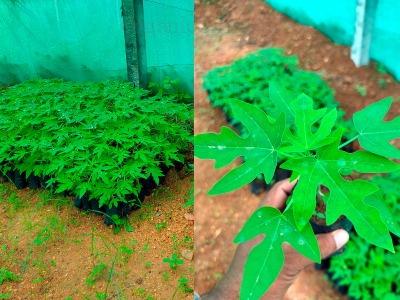
Papaya seeds are sown in poly bags in a shade net usually before monsoon season. Young plants are transplanted to main field after they have grown for a month and a half or so. The plant is technically a herb though it takes the form of a small tree. The plants take about 9 months to start fruiting and continue to bear fruit for a couple of years.
Good papaya fruits come from well grown papaya plants and yield quality and quantity is dependent on soil and climatic factors. Papaya is very vulnerable to water logging, diseases and insects. Birds including peacocks, squirrels, monkeys, insects are among those who take a first share of the fruits.
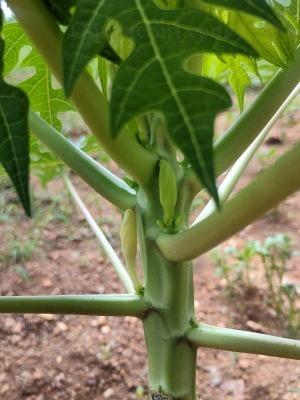
Growing organic papaya is quite involved. Providing regular plant nutrition, optimal irrigation, pest and disease management are paramount. Historically papaya crop was wiped out across entire states in some countries due to Ring Spot, Mosaic and Leaf Curl viruses. Plant viral diseases do not have control measures except uprooting affected plants and protecting the crop from insect vectors that transmit the diseases. A few fungal diseases such as foot rot and insect pests affect papaya as well. In fact, we have lost some papaya crops a few years back but that does not deter us from picking it up again with greater resolve.
Effect of Rains on Our Papaya
A few days of rain and water logging can kill papaya. This year saw relentless rains for several days on end that impacted some our standing crop. Some of the plants recovered at the end of the rainy season but some unfortunately perished.
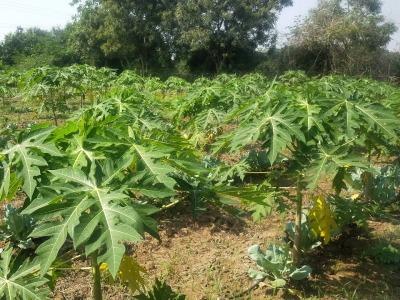
Our Current Organic Papaya Crops
We have three papaya crop types in our C-Farm and N-Farm in different stages as of Dec-2021.
We select papaya types that are good in taste & aroma, at the same time being tolerant to common plant virus disease – Papaya Ring Spot. This disease can wipe out entire crop in a matter of days. Our current yield comes from crop in C-Farm, of a tolerant type IPB9 (Calina) we had procured from Indonesia a couple of years back.
This monsoon season, we have supplemented our papaya with fresh sowings of two tolerant types again. We have sown Taiwan Red Lady in C-Farm and Lalpari in N-Farm. Red Lady is traditionally well known for its Ring Spot tolerance but we saw a possible breakdown of the tolerance in our crop a few years back, that led to a complete devastation. We are however trying it out again this time and are hoping for better. We have thus far rogued out a few plants that seemed to have been affected by Ring Spot in the new Red Lady plants at C-Farm.
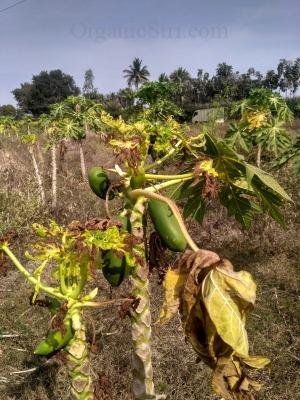
Nurturing Organic Papayas
Papayas need nurtured well. Copious dairy manure, poultry manure, biofertilizers are the main source of plant nutrition for our plants. Regular protective bioagent sprays help minimize impacts of insects and pests. We also grow and plough in legumes such as Jeeluga to bring in some amount of nitrogen to the plants. Careful irrigation and monitoring for health every day are part of our farm routine.
Currently, our papaya is intercropped with chillies, potato, tomato, cabbage and cauliflower at our C-Farm and with potato at our N-Farm.
Ripe Papaya Fruit, Raw Papaya Fruit, Papaya Leaf
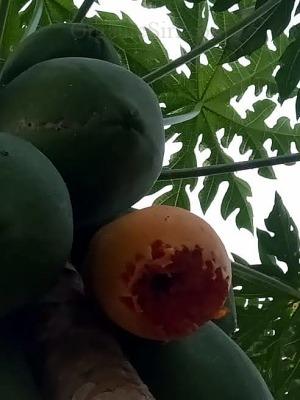
Besides ripe fruit, we occasionally harvest raw papaya fruit, prized by some for curry preparation. If you are keen on raw papaya, send us a message and we will make it available in the next harvest.
Papaya leaves are prescribed for those who need to restore blood platelets – there are some medicines made out of the leaves too. We don’t normally pluck papaya leaves, but if you are in dire need for some, do leave us a message and we will try our best to get some for you.
Ripening Organic Papaya
Papaya is a climacteric fruit – meaning it ripens after plucking, provided the fruit has matured, i.e., if the fruit has begun turning yellow in parts. We typically harvest fruit that is at least 30% yellow. Ripening papaya is easy, simply wrap the fruit in a paper and leave at room temperature, to accumulate the ethylene produced by the fruit that further speeds up ripening. To ripen even faster, place a banana together with papaya. Typically, papayas in the market are not ripened using chemical ripeners, and hence artificial ripening is not a large concern like it is in mango.
Does Organic Papaya Taste Better?
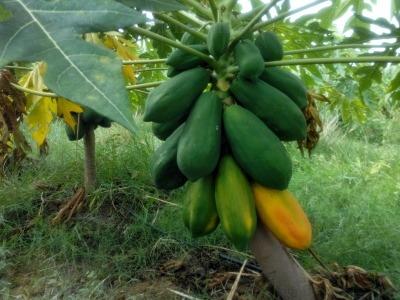
While taste and aroma of the fruit at any point of time are dependent on a large number of plant and environmental factors, our customers tell us our papaya has distinct superior taste and flavor. Try and tell us what you think!
Should You Eat Organic Papaya?
Definitely yes. Papaya is a very delicate crop needing lots of nurturing and has a number of deadly diseases impacting it. This means large quantities of pesticides need applied to grow and protect it in conventional cultivation. Organic Papaya is free of these pesticide applications and hence significantly superior. We will leave it up to you to read about general benefits of organic fruits – antioxidants and other beneficial elements.

